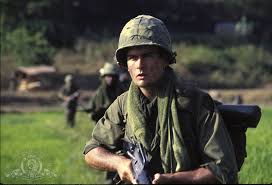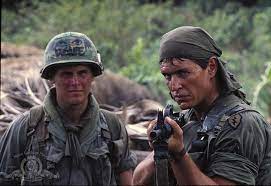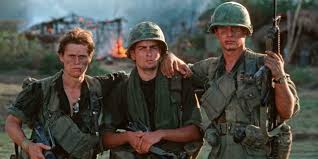Platoon (1986)

Platoon (1986)
Platoon (1986), directed by Oliver Stone, is one of the most harrowing and realistic portrayals of the Vietnam War ever committed to film. It’s a visceral, unflinching look at the brutality of war, the psychological toll it takes on soldiers, and the moral ambiguities they face. Drawing from Stone’s own experiences as a soldier in Vietnam, Platoon remains a powerful, definitive work on the subject, earning critical acclaim and numerous accolades, including four Academy Awards, including Best Picture and Best Director.
Unlike many war films of the time, which often depicted the heroism of soldiers or focused on grand battles, Platoon presents the grim, chaotic, and dehumanizing nature of the conflict. The film doesn’t glorify war but instead shows it as a brutal and often senseless experience, with soldiers caught in an internal and external battle that tests their courage, morality, and humanity. It’s a film about the everyday horrors of war, and it continues to stand as a deeply impactful, timeless cinematic achievement.
Plot Overview: The Struggles of Young Soldiers in Vietnam
The story of Platoon is told through the eyes of Chris Taylor (played by Charlie Sheen), a young man who voluntarily enlists in the U.S. Army to fight in Vietnam. Chris is idealistic at the beginning, eager to serve his country, but soon finds himself immersed in the horrific realities of war. As he joins a platoon of soldiers in the jungles of Southeast Asia, he’s forced to confront not only the physical dangers of combat but also the moral dilemmas that come with the violence and chaos of war.
The platoon is led by two very different sergeants: the tough, seasoned, but ultimately cynical Sergeant Barnes (Tom Berenger) and the more idealistic and morally conflicted Sergeant Elias (Willem Dafoe). The tension between the two men—Barnes being a pragmatic, hardened veteran who believes in the necessity of ruthless action, and Elias being a more compassionate leader trying to hold onto his humanity—is central to the film’s moral conflict.
Chris Taylor is torn between these two figures, who embody the conflicting ideologies that soldiers often face in war. Barnes represents the dark side of survival, focusing on violence and pragmatism to get through the war, while Elias represents a more spiritual, humanistic approach to survival, emphasizing compassion and the importance of retaining one’s humanity in the face of the senselessness of conflict. Their rivalry comes to a head as the platoon faces intense combat, culminating in an emotionally devastating battle that forces Chris and the other soldiers to reckon with the full cost of war, both physically and psychologically.
The Horrors of War: A Raw, Uncompromising View
Platoon stands out for its brutal, unflinching portrayal of the Vietnam War. The film doesn’t attempt to romanticize or glorify war but instead shows it as a harrowing, senseless, and often soul-crushing experience. Oliver Stone’s direction ensures that the violence is depicted with such intensity that it’s not entertaining; it’s disturbing and chaotic. There is no heroism or grandeur in the battles; instead, we witness the fear, confusion, and moral degradation that soldiers experience as they are caught in the middle of a seemingly endless conflict.
The film uses the jungle as both a literal and metaphorical backdrop for the soldiers’ struggles. The dense, claustrophobic environment mirrors the mental and emotional confinement that the soldiers experience. The jungle is a place where men are trapped, surrounded by danger, their survival dependent on the whims of fate and the constant threat of ambush. Stone’s vivid direction, using close-up shots and erratic camera work, places the viewer in the middle of the action, making the chaos of the battlefield feel immediate and overwhelming.
The film also delves into the psychological toll that war takes on soldiers. Throughout the film, we see soldiers dealing with the constant fear of death, the horrors of war, and the breakdown of their moral compass. The ambiguity of good versus evil is explored through their actions, with some soldiers committing atrocities, while others attempt to hold on to some semblance of honor or humanity. The psychological fragmentation of the soldiers is perhaps most poignantly captured in Chris Taylor’s arc, as he transitions from a wide-eyed idealist to a disillusioned, hardened veteran.
One of the most powerful aspects of Platoon is the moral ambiguity at play. There is no clear-cut villain or hero. Instead, the film presents a complex portrait of war as something that forces individuals to make impossible choices in order to survive. The conflict between Barnes and Elias is representative of the wider ideological struggle faced by the men in the platoon—how to maintain one’s humanity in the face of unrelenting violence. This moral ambiguity heightens the emotional weight of the film, making it less about the external threat of the enemy and more about the internal conflicts that rage within the soldiers themselves.
The Characters: A Portrait of Soldiers Struggling with War
The characters in Platoon are not mere archetypes but fully realized individuals who, despite being soldiers, reflect the diversity of human emotions and struggles. Charlie Sheen’s portrayal of Chris Taylor is both vulnerable and resolute. As the protagonist, he serves as the audience’s entry point into the film’s world, and Sheen’s performance perfectly captures the character’s evolution from naïve idealism to painful disillusionment. Chris’s internal conflict is one of the emotional pillars of the film, as he is forced to grapple with the horrors of war and his own capacity for violence and survival.
Tom Berenger’s portrayal of Sergeant Barnes is one of the film’s standout performances. Barnes is a morally complex character, a man who has survived the horrors of war by becoming hard, calloused, and ruthless. Berenger’s performance is chilling, and his character embodies the dark side of survival in war—the idea that in order to stay alive, one must embrace brutality and abandon any remaining sense of morality. Barnes’ actions throughout the film, especially his ruthless decisions in combat, challenge the notion of heroism and force the audience to question what it means to survive in such a brutal environment.
Willem Dafoe’s Sergeant Elias is the emotional counterpoint to Barnes. Elias is the character who tries to hold onto his humanity in the face of everything that war throws at him. Dafoe’s portrayal is equally compelling, and Elias’s emotional depth makes him a more sympathetic figure than Barnes. Elias is a man caught between his duty as a soldier and his desire to protect his men from the moral and physical ravages of war. His tragic fate and the tension between him and Barnes form the emotional backbone of the film.
The supporting cast is also strong, with actors like Forest Whitaker, Johnny Depp, and Keith David delivering memorable performances. The film gives each character enough screen time to showcase their personalities and struggles, and while they may not all be as developed as the central characters, their presence adds to the film’s authenticity and emotional impact.
Cinematography and Sound Design: A Gritty, Immersive Experience
The cinematography by Robert Richardson is one of the standout technical achievements of Platoon. The film’s use of lighting, camera angles, and color tones emphasizes the harshness of the environment. The jungle is depicted as both beautiful and terrifying, its lush greenery hiding danger at every turn. The camera often stays close to the characters, allowing the viewer to experience the chaos of battle from a soldier’s point of view.
The film’s use of natural lighting, particularly in the jungle scenes, enhances the feeling of authenticity. The scenes in the dark, murky jungles of Vietnam are often lit by flashes of gunfire or explosions, casting harsh shadows and making the soldiers appear even more vulnerable in the face of danger. The use of tight framing and hand-held camera work creates an intense, claustrophobic atmosphere, ensuring that the viewer feels the soldiers’ tension, fear, and confusion.
The sound design is equally effective. The sounds of gunfire, explosions, and the ever-present hum of the jungle amplify the sense of danger, and the film’s score—composed by Georges Delerue—is subtle yet haunting, adding emotional weight to the film’s most pivotal moments. The sound of helicopters hovering overhead, the rumble of distant artillery, and the soft sounds of the jungle all combine to create a truly immersive experience.
Themes: The Horror of War, Morality, and Survival
The central themes of Platoon revolve around the horrors of war, the loss of innocence, and the complex morality of survival. The film does not glorify war, but instead shows it as a nightmarish experience that strips men of their humanity, leaving them to grapple with the psychological and moral consequences of their actions. The film asks difficult questions about the nature of war and whether it’s possible for soldiers to remain “good” men in the face of overwhelming violence.
The conflict between Barnes and Elias represents two opposing views on how to survive in war: one through brutal pragmatism and the other through compassion and a desire to protect one’s humanity. Chris Taylor’s journey—his eventual acceptance of the violence around him, followed by the emotional and moral toll of that violence—forms the emotional heart of the film.
The film also highlights the futility of war and the emotional damage it inflicts on all who participate. Even those who survive the war are left emotionally and mentally scarred, unable to fully escape the trauma they’ve experienced. The film’s portrayal of the psychological toll of combat makes it clear that the real enemy is not just the opposing force, but the war itself and the demons it creates in the minds of those who fight it.












